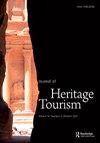居民对旅游业影响的感知及其对旅游业发展的支持——对土耳其Bektashi信仰目的地的研究
IF 2.2
Q2 HOSPITALITY, LEISURE, SPORT & TOURISM
引用次数: 0
摘要
先前的研究广泛地探讨了不同目的地背景下居民对旅游影响的感知与他们对旅游发展的支持之间的联系。然而,关于居民对旅游对其信仰影响的看法以及这些看法如何影响信仰旅游目的地的性病的文献仍然薄弱。本研究试图通过调查居民对旅游的经济、文化、环境、社会和信仰影响的看法与他们在别克塔西信仰旅游地的性病之间的联系来填补这一空白。共从本文章由计算机程序翻译,如有差异,请以英文原文为准。
Residents’ perception of tourism impacts and their support for tourism development: a study of a Bektashi faith destination in Türkiye
ABSTRACT Prior research has broadly addressed the link between residents’ perceptions of tourism impacts and their support for tourism development (STD) in different destination-based contexts. However, the literature on residents’ perceptions of the impacts of tourism on their faith and how these perceptions affect their STD in a faith tourism destination remains tenuous. This study seeks to fill this gap by investigating the link between residents’ perceptions of the economic, cultural, environmental, social and faith impacts of tourism and their STD in the Bektashi faith tourism destination. A total of 244 valid questionnaires were obtained from the inhabitants of Nevşehir, Türkiye. The authors applied fuzzy-set qualitative comparative analysis (fsQCA) and PLS-SEM as asymmetrical and symmetrical approaches, respectively. The symmetrical approach demonstrated that only perceived cultural, social and faith impacts positively and significantly affect residents’ STD. The asymmetrical results provided more complex compounds of tourism impacts, with six configurations sufficient to create a high level of STD. The fsQCA analysis confirmed that only perceived faith impact was a necessity in determining residents’ STD. The results of the study suggest that, in order for faith tourism destinations to thrive, responsible authorities should avoid diminishing the faith elements.
求助全文
通过发布文献求助,成功后即可免费获取论文全文。
去求助
来源期刊

Journal of Heritage Tourism
HOSPITALITY, LEISURE, SPORT & TOURISM-
CiteScore
6.50
自引率
11.10%
发文量
39
期刊介绍:
The Journal of Heritage Tourism ( JHT ) is a peer-reviewed, international transdisciplinary journal. JHT focuses on exploring the many facets of one of the most notable and widespread types of tourism. Heritage tourism is among the very oldest forms of travel. Activities such as visits to sites of historical importance, including built environments and urban areas, rural and agricultural landscapes, natural regions, locations where historic events occurred and places where interesting and significant living cultures dominate are all forms of heritage tourism. As such, this form of tourism dominates the industry in many parts of the world and involves millions of people. During the past 20 years, the study of tourism has become highly fragmented and specialised into various theme areas, or concentrations. Within this context, heritage tourism is one of the most commonly investigated forms of tourism, and hundreds of scholars and industry workers are involved in researching its dynamics and concepts. This academic attention has resulted in the publication of hundreds of refereed articles in various scholarly media, yet, until now there has been no journal devoted specifically to heritage tourism; Journal of Heritage Tourism was launched to fill this gap. JHT seeks to critically examine all aspects of heritage tourism. Some of the topics to be explored within the context of heritage tourism will include colonial heritage, commodification, interpretation, urban renewal, religious tourism, genealogy, patriotism, nostalgia, folklore, power, funding, contested heritage, historic sites, identity, industrial heritage, marketing, conservation, ethnicity, education and indigenous heritage.
 求助内容:
求助内容: 应助结果提醒方式:
应助结果提醒方式:


